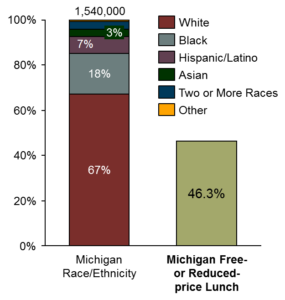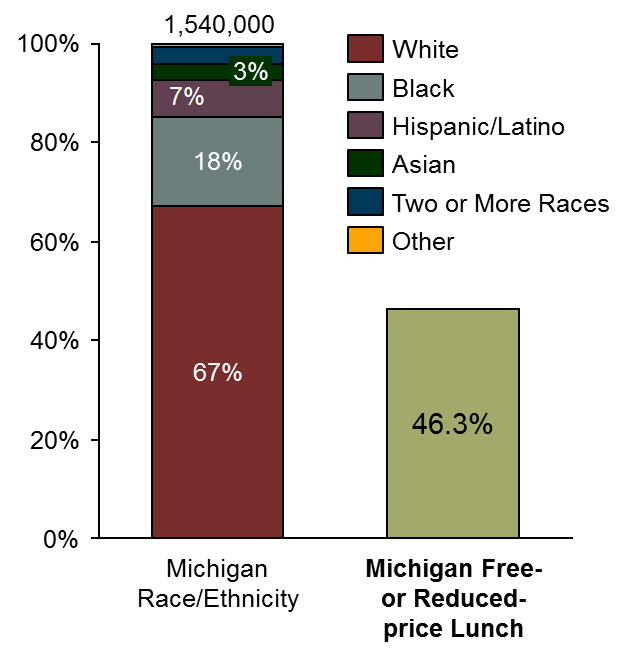Tonight is Betsy DeVos’ confirmation hearing to become the next Secretary of Education. Because DeVos doesn’t have a track record as a government official or leader within the public school or higher education system, as most of her predecessors do, analysts are looking at her role as a funder, GOP donor, and board member of education organizations to understand what she might do as Secretary. This scrutiny has drawn particular attention to DeVos’ engagement in education advocacy and political causes in Michigan, where her donations and advocacy have touched many major education policy decisions over the past 20 years.
In many ways, the education system in Michigan is a microcosm of the challenges and opportunities facing the broader U.S. education system — and the next Secretary of Education. In both Michigan and the U.S. as a whole, there are large, persistent achievement gaps for disadvantaged student groups; rural, suburban, and urban schools with unique (sometimes competing) needs; and a long history of hotly debated education reforms that have had mixed success. To help analysts, journalists, policymakers, and practitioners make sense of the education landscape in the Wolverine State — and what it suggests about the perspective and positions DeVos would bring to the role of Secretary — Bellwether has compiled a comprehensive fact base about the education policy landscape in Michigan that we will release next week after the Inauguration.
In the meantime, here are a few Michigan fast-facts to know as you watch tonight’s hearing:

Demographics of Michigan K-12 students by race/ethnicity and family income. Source: MISchoolData.org
- There are over 1.5 million students in Michigan and nearly half of them qualify for free and reduced-price lunch; more than 33 percent are students of color.
- Michigan ranks 41st in 4th grade reading performance in the U.S. and 42nd in 4th grade math.
- 35 percent of Michigan 11th grade students are college-ready according to the SAT; there are substantial gaps in college-readiness rates among black, Hispanic, English language learner, and low-income students.
- Michigan has one of the nation’s largest charter sectors, with 10 percent of students enrolled in charter schools, about 300 charter schools, and over 40 charter authorizers.
- Over 70 percent of Michigan charter schools are operated by for-profit education service providers.
- Detroit is the lowest performing urban school district in the country.
- Detroit charter schools generally outperform Detroit Public Schools, but there are still concerns about the overall quality of the sector.
Given the above facts, here are a few questions we’d like DeVos to answer at tonight’s confirmation hearing:
- What should be the role of the federal government in addressing longstanding achievement gaps for low-income students and students of color, like those that exist in Michigan?
- As you know, Detroit students have struggled academically and gone through numerous failed reform efforts over several decades. Given your work in Detroit, what turnaround strategies would the Department of Education encourage for chronically low-performing school districts?
- What did you learn from advocating for expanded school choice measures in Michigan and how might you enact those measures at the federal level as Secretary of Education?
- The presence of multiple charter school authorizers in Michigan has decentralized charter responsibility in the state. What quality-control and accountability measures are necessary for charter school authorizers? What should be the federal role in setting that bar?
- What has your experience and observation of school choice and school turnaround efforts in Michigan taught you about potential strategies for improving low-performing schools? How would those lessons be applied to this spring’s review of states’ Every Student Succeeds Act plans?
Betsy DeVos’ hearing begins at 5pm and can be watched here. Check back here tomorrow for a recap of major events (and anything about Michigan education that needs a fact check).
To read our other coverage of Betsy DeVos, click here.
